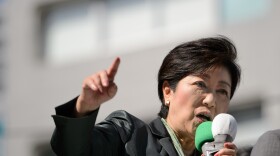
Elise Hu
Elise Hu is a host-at-large based at NPR West in Culver City, Calif. Previously, she explored the future with her video series, Future You with Elise Hu, and served as the founding bureau chief and International Correspondent for NPR's Seoul office. She was based in Seoul for nearly four years, responsible for the network's coverage of both Koreas and Japan, and filed from a dozen countries across Asia.
Before joining NPR, she was one of the founding reporters at The Texas Tribune, a non-profit digital news startup devoted to politics and public policy. While at the Tribune, Hu oversaw television partnerships and multimedia projects, contributed to The New York Times' expanded Texas coverage, and pushed for editorial innovation across platforms.
An honors graduate of the University of Missouri-Columbia's School of Journalism, she previously worked as the state political reporter for KVUE-TV in Austin, WYFF-TV in Greenville, SC, and reported from Asia for the Taipei Times.
Her work at NPR has earned a DuPont-Columbia award and a Gracie Award from the Alliance for Women in Media for her video series, Elise Tries. Her previous work has earned a Gannett Foundation Award for Innovation in Watchdog Journalism, a National Edward R. Murrow award for best online video, and beat reporting awards from the Texas Associated Press. The Austin Chronicle once dubiously named her the "Best TV Reporter Who Can Write."
Outside of work, Hu has taught digital journalism at Northwestern University and Georgetown University's journalism schools and served as a guest co-host for TWIT.tv's program, Tech News Today. She's on the board of Grist Magazine and is a member of the Council on Foreign Relations.
-
Megan Hunter's new book follows a woman and her newborn who flee an epic flood. "What would it be like if there was an environmental crisis ... in London," she asks, "and where would people go?"
-
In the 1980s, Japan built thousands of golf courses and the game became baked into its business culture. Those days are over. Golf participation in Japan has dropped by 40 percent since 1996.
-
Alabama Senate candidate Roy Moore has questioned why it took decades for women to come forward and accuse him of sexual misconduct, and it's not the first time women have gotten that reaction.
-
Statues symbolizing the World War II sex slaves abused by Japanese soldiers have appeared this year on Korean city buses — including on a bus line whose doors open right in front of Japan's embassy.
-
When South Korea issued its sex education guidelines for public schools in 2015, there was an outcry and there were calls for them to be withdrawn. Two years later, the guidelines remain in place.
-
In Tokyo, Trump met relatives of Japanese citizens taken by North Korea in the 1970s. A handful have been freed over the years, but families are divided over the best way to gain release of the rest.
-
Despite lukewarm support as a leader, Shinzo Abe's ruling party handily defeated upstart opponents in a snap general election on Sunday.
-
Yuriko Koike, the best known woman in Japanese politics, started a new party ahead of Sunday's snap election for parliament. But it's having trouble distinguishing itself from the ruling party.
-
The U.S. space agency and the South Korean government teamed up for the most ambitious study of Korean air quality to date and found the majority of the toxic air is homegrown, and not from neighbors.
-
In an extraordinary statement released through state media, the North Korean leader says the U.S. president is "surely a rogue and a gangster fond of playing with fire, rather than a politician."









